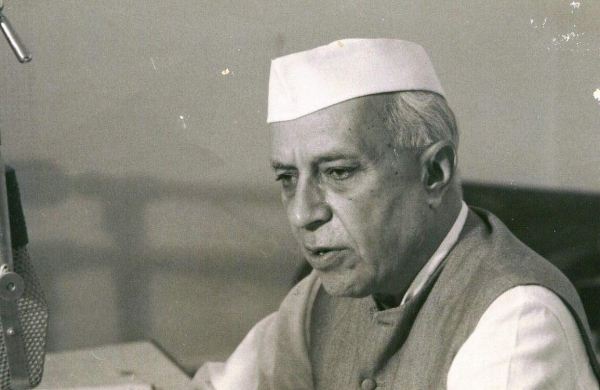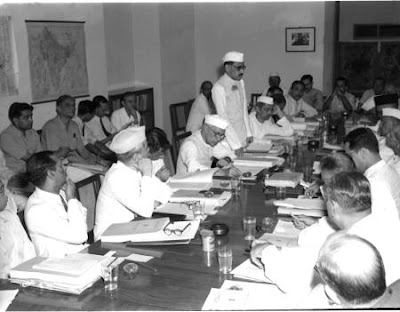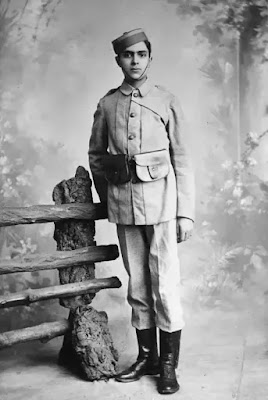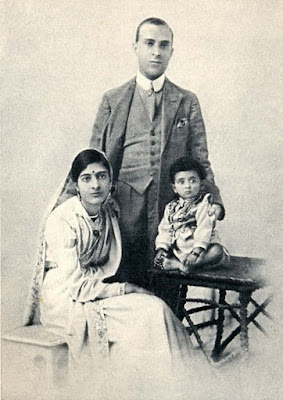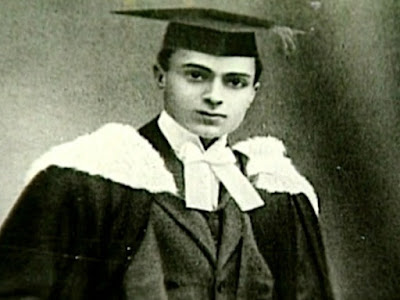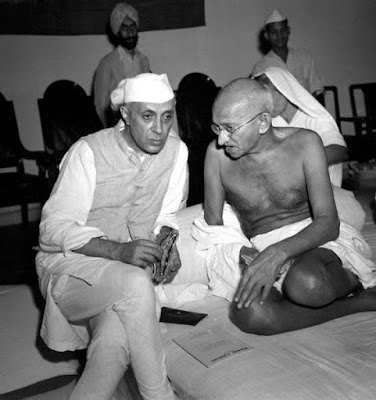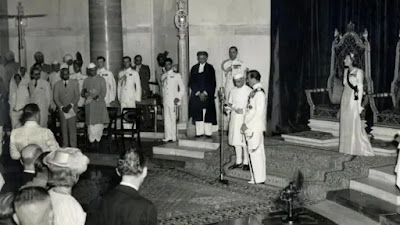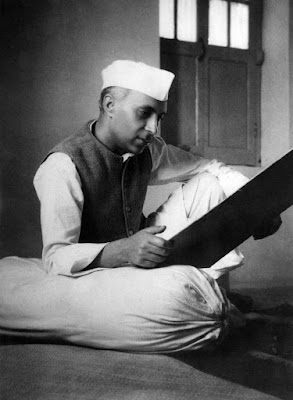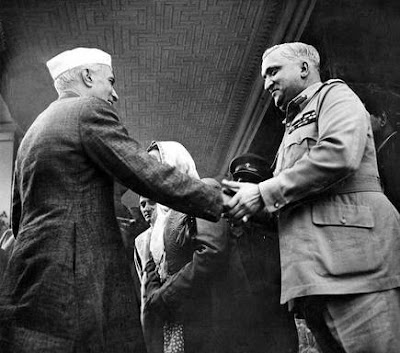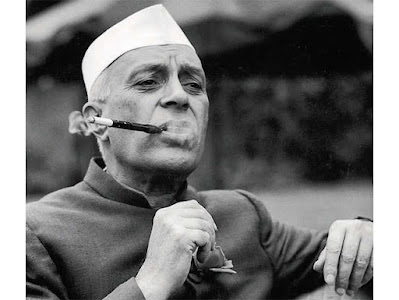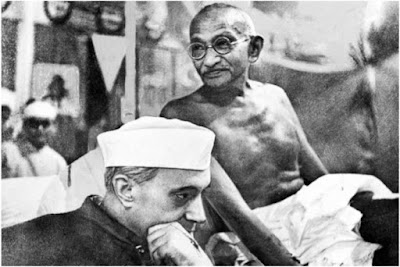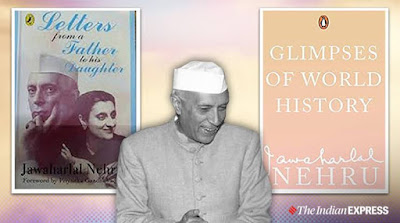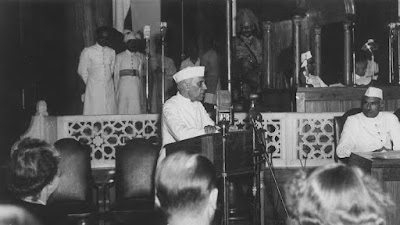Why is Jawaharlal Nehru called the architect of modern India?
Jawaharlal Nehru is considered to be the architect of modern India.
He was one of the foremost leaders of the Indian Freedom Struggle, and the favorite disciple of Mahatma Gandhi. Later, he went onto become the first Prime Minister of India.
Nehru was admired all over the world for his visionary thinking, ard played a major role in making India a sovereign, socialist, secular, and democratic republic, He set up a Planning Commission, encourage the development of science and technology, and launched three successive five-year plans. His policies led to a sizable growth in agricultural and industrial production.
Nehru played a major role in developing independent India foreign policy. Not only was he a brilliant orator, A charming, and noble thinker and philosopher, he was a writer, too. He served as the prime minister from 1947 until his death in 1964, and with his passing away India mourned the death of one of her greatest sons.
What do we know about Nehru’s early life?
Jawaharlal Nehru’s father, Motilal Nehru, was a very wealthy barrister. He served twice as President of the Indian National Congress during the independence struggle, and the young Jawaharlal was deeply influenced by his father’s ideals. He was educated at home by private tutors, and later, went to England for his higher studies.
Jawaharlal graduated from Trinity College, Cambridge, and then he enrolled at the Inner Temple, where he trained to be a barrister.
During this time, Nehru also started developing a sense of nationalism. Nehru returned to India in 1912, and started practising law as a barrister at the Allahabad High Court. Gradually, he involved himself in national politics.
What was Jawaharial Nehru’s academic background?
Moilal Nehru decided that his son should qualify for and serve the Indian Civil Services or I.C.S. So, he sent Jawaharlal to Harrow, an elite public school in England.
Jawaharlal Nehru studied first at Harrow, and then at Cambridge. Nehru studied natural science at Cambridge University.
He blossomed in the liberal atmosphere of the university, which encouraged a host of non-academic activities. Next, Nehru joined the Inner Temple for his legal studies in October 1910. He passed the Bar final examination in 1912.
It was in England that Nehru became passionate about the Indian nationalist movement, and was convinced that the English administration wilfully discriminated against Indians. His stay in London instilled in him the dream of a free India.
What are Jawaharlal Nehru’s contributions to the Freedom Struggle?
It was in 1916, that Nehru first met Mahatma Gandhi and was inspired by his belief that non-violence and civil disobedience were the righteous paths to freedom.
In the same year, Nehru actively participated in the Lucknow session of the Congress. In the course of the struggle for Swaraj, Jawaharlal Nehru was imprisoned for his active participation in the civil disobedience campaign. He was instrumental in giving the Freedom Struggle an international appeal when he attended the congress of oppressed nationalities in Brussels in Belgium in 1927.
After many socialist activities, violations, and civil movements, the British Empire in India was overthrown, and India became independent on 15" August 1947, with Jawaharlal Nehru at the helm as Prime Minister.
Why is Nehru considered to be a remarkable Prime Minister?
Jawahartal Nehru was the Prime Minister of India from 1947 to 1964. During this period, Nehru brought about far reaching changes in India’s domestic, economic, agricultural, and social policies. He established many basic and heavy industries as well as numerous institutions of higher learning. He was the brain behind the formation of the National Defence Academy, and the Atomic Energy Commission of India.
He advocated a mixed economy where a government controlled public sector co-existed peacefully with the private sector. In his foreign policy. Nehru initiated the concept of non-alignment or neutrality. To sum up, Jawaharlal Nehru as Prime Minister imparted modeen values and thought, stressed secularism, insisted upon basic unity of India, and, carried India into the modern age of scientific innovation and technological progress.
What was the Importance of Nehru’s economic policies?
Nehru’s economic policies were far reaching, and their effects are felt to this day. Nehru was a firm believer in state control over the economic sectors.
One of Nehru’s key economic reforms was setting up of the Planning Commission, and the introduction of the Five Year Plan in 1951. The commission is responsible for formulating the ‘Five-Year Plans’ of the Indian economy.
Jawaharlal Nehru concentrated his economic policies on rural development, and the Indian rural economy was allotted a lion’s share of the first Five-Year Plan fund money. Land redistribution plans were also undertaken during Jawaharlal Nehru’s tenure as the prime minister.
What were the social reforms that took place when Nehru was Prime Minister?
Jawaharlal Nehru started a process of social reforms while he as Prime Minister. He was passionate about education, and his government saw the establishment of many institutions for higher learning.
Initiatives such as the provision of free milk and meals to children to fight malnutrition were launched, along with adult education and vocational training centres, as well as technical schools.
Nehru fought the evils of the caste system. and changed the existing Indian laws to correct inequalities. He sought to promote religious harmony.
He was also an ardent supporter of women's rights and did his best to increase the legal right and social freedom of women in India.
What were Nehru's contributions to the field of foreign policy?
Nehru wanted India to have her own unique identity in the world and believed in the principle of non-alignment.
This meant that India would remain impartial and independent of any commitment to either of the power blocs that existed then.
In fact, he co-founded the Non-Alignment Movement of nations that remained neutral between the rival blocs of nations led by the US and the USSR.
Also, Read, Did Nehru Give India's Permanent Seat At UNSC to China?
He also believed that honesty and goodwill were the keys to a harmonious relationship with other nations. He tried to steer India away from violence and war, towards peace and development.
On the international scene, Nehru was a champion of peaceful co-existence and a strong supporter of the United Nations.
Why was the relationship between Gandhiji and Nehru unique?
Mahatma Gandhi and Jawaharlal Nehru were two of India’s greatest sons. Nehru’s father Motilal Nehru and Mahatma Gandhi knew each other very well, and that was how Jawaharlal Nehru became acquainted with Mahatma Gandhi.
The two of them first met at the annual meeting of the Indian National Congress in the year 1916 at Lucknow.
In Gandhiji, Nehru found an absolute leader who inspired him. He threw his heart and soul into the freedom movement in 1929 under the patronage.
of Mahatma Gandhi, Jawaharlal became the President of the Indian National Congress. Nehru gradually emerged as the paramount leader of the Indian independence movement. Although Gandhi did not officially designate Nehru his political heir until 1942, the country as early as the mid-1930s saw in Nehru, the natural successor to Gandhi.
In later years, they may have differed on some issues, but the love and respect they had for each other remained as strong as ever until Gandhiji passed away, leaving behind a shattered Nehru.
What is Panchsheel?
The word Panchsheel refers to the five principles of peaceful co-existence between neighboring countries.
The word comes from two Sanskrit words- 'Panch' meaning 'five' and 'sheel' meaning 'virtue'. The first is to respect each other's territorial boundaries and sovereignty and the second is to pursue a policy of non-aggression. The third principle is not to interfere in domestic affairs, while the fourth emphasizes equality and mutual benefit. The fifth and final principle is to ensure peaceful co-existence by observing all the previous principles.
Panchsheel served as a guide for the relationship between India and China. However, China failed to follow these guidelines and attacked India in 1962, when Nehru was the Prime Minister.
What are Nehru’s contributions to the Non-Alignment Movement?
Nehru joined with other world leaders like — Tito, Nasser, and Sukarno to establish the Non-Alignment Movement or NAM.
The objectives of this movement were to help other colonies win freedom by peaceful means and to remain impartial in the Cold War between the US and the Soviet Union.
After Nehru’s successful mediation in the Korean War and the Congo problem, which put an end to a long and violent struggle, his status as a statesman reached new heights.
Why was Nehru’s decision of integration of state remarkable?
Which are the popular books written by Jawaharlal Nehru?
All through his life, Jawaharlal Nehru lost no opportunity to write, whether it was drafts and resolutions for his party, Essays on issues of the day, or letters to friends and family.
He was a wonderful writer and the author of several books. His works include ‘The Discovery of India’ which is his most popular book, and ‘Glimpses of World History’, which gives a view on world history. His letters to his daughter Indira, written while he was in jail, were compiled in the form of a book, known as ‘Letters from a Father to His Daughter.’ ‘An Autobiography with Musings on Recent Events in India’, is another of his books.
Which are the major books about Jawaharlal Nehru?
Nehru's life has been the subject of many books by famous authors like Frank Moraes, Donald E. Smith, Michael Brecher, S. Gopal, and M.N. Das.
Marie Stenton wrote 'Panditji: a portrait of Jawaharlal Nehru’ in 1967. It has proved to be a valuable book for students of Indian history. K. Natwar Singh's, 'The Legacy of Nehru: A Memorial Tribute' sums up Nehru's achievements and evaluates his place in history.
There are also hundreds of books written in different regional languages about India's first prime minister.
Why was Nehru considered to be a great orator?
Long years ago, we made a tryst with destiny, and now the time comes when we shall redeem our pledge, not wholly or in full measure, but very substantially. At the stroke of the midnight hour, when the world sleeps, India will awake to life and freedom
Recommended Buy
Tags:
